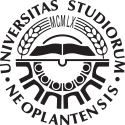15MKMK065 - World Novel
| Course specification | ||||
|---|---|---|---|---|
| Course title | World Novel | |||
| Acronym | 15MKMK065 | |||
| Study programme | Hungarian language and literature | |||
| Module | ||||
| Type of study | first degree undergraduate academic studies | |||
| Lecturer (for classes) | ||||
| Lecturer/Associate (for practice) | ||||
| Lecturer/Associate (for OTC) | ||||
| ESPB | 3.0 | Status | ||
| Condition | None. | Oblik uslovljenosti | ||
| The goal | The students get acquainted with the most relevant novel paradigms of the 20th century, through the motive of labyrinth as a kind of hell. They get a deeper knowledge on the poetics of metanarration, fiction, seeking and the forms of intertwined relationship between semiotics and narrative. They develop an orienting skill in the context of world literature. | |||
| The outcome | The students will be acquainted with the most relevant novel paradigms of the 20th century through the motive of labyrinth as a kind of hell. They will have knowledge about the poetics of metanarration, fiction, seeking and the forms of intertwined relationship between semiotics and narrative. They will have a developed orienting skill in the context of world literature. | |||
| Contents | ||||
| Contents of lectures | Labyrinth, island, night, insanity, artificial paradises as the metaphors of a journey through hell. Csicsik's circular journey: carnival-like, merry hell in Gogol's Dead souls. The untransparent underworld in Kafka's novel The Castle. The modern odyssey of Leopold Bloom - James Joyce: Ulysses. The labyrinths of jeans prose - Salinger: The Catcher in the Rye. The labyrinth of nihilism in jeans prose: Jack Kerouac: On the Road. The labyrinth of time - Proust: In Search of Lost Time. 1. The devil-like background of human commitment - Thomas Mann: Doctor Faustus. Labyrinth of insanity - Faulkner: The Sound and the Fury. The topos of labyrinth in the novel One Hundred Years of Solitude by Gabriel García Márkez. Grotesque fiction of hell of the 20th century in Bulgakov's novel The Master and Margarita. The book and the library as a labyrinth in Borges's works (Aleph, The Book of Sand, The Library of Babel, Garden of Forking Paths, The Circular Ruins, Secret Miracle). The book and the library as a labyrinth in Umberto Eco's detective novel The Name of the Rose. Cormac McCarthy> No Country for Old Men. | |||
| Contents of exercises | Presentations, writing papers, essays | |||
| Literature | ||||
| ||||
| Number of hours per week during the semester/trimester/year | ||||
| Lectures | Exercises | OTC | Study and Research | Other classes |
| 2 | 0 | |||
| Methods of teaching | lectures, presentations, interactive analysis of works, developing writing skills | |||
| Knowledge score (maximum points 100) | ||||
| Pre obligations | Points | Final exam | Points | |
| Activites during lectures | 10 | Test paper | 0 | |
| Practical lessons | 20 | Oral examination | 70 | |
| Projects | ||||
| Colloquia | ||||
| Seminars | ||||

